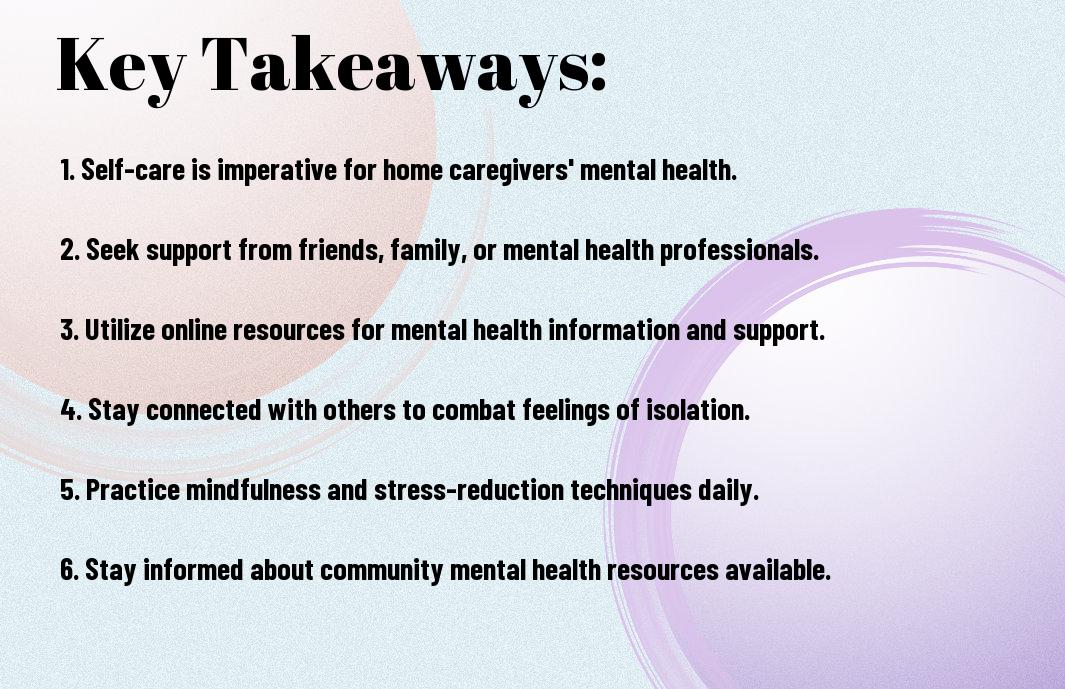Most crucial in the journey of caregiving is maintaining one’s own mental well-being. This informative guide is a collection of important mental health resources tailored to support and uplift those who tirelessly care for their loved ones at home. In the spirit of empathy and understanding, these resources aim to provide comfort and guidance to caregivers navigating the complexities of their self-care journey.

Key Takeaways:
- Self-care is vital: Caregivers must prioritize their own mental health and well-being to effectively care for others.
- Seek out support groups: Connecting with other caregivers can provide a sense of community and understanding.
- Utilize telehealth services: Online therapy or support sessions can offer convenient mental health resources for caregivers.
- Practice mindfulness: Techniques like meditation and deep breathing can help reduce stress and improve mental well-being.
- Consider professional counseling: Speaking with a mental health professional can provide valuable support and coping strategies for caregivers.

Recognizing the Need
Your role as a home caregiver is incredibly important, but it can also take a toll on your mental well-being. It’s crucial to recognize when you need support and to prioritize your own mental health. Caregiving can be emotionally draining, and it’s common to experience feelings of stress, anxiety, and even depression. It’s crucial to acknowledge these emotions and seek help when needed.
The Emotional Toll of Caregiving
Any caregiver can attest to the emotional rollercoaster that comes with the responsibility. You may find yourself feeling overwhelmed, exhausted, and isolated at times. The constant worry and demands of caregiving can lead to a range of emotions that are completely normal but can become overwhelming if not addressed. It’s important to remember that taking care of yourself is not a luxury but a necessity. Self-care strategies such as setting boundaries, practicing mindfulness, and seeking support from other caregivers or mental health professionals can make a significant difference in your well-being.
Common Mental Health Challenges Faced by Home Caregivers
Recognizing the signs of common mental health challenges faced by home caregivers is crucial in addressing these issues effectively. Caregivers often experience symptoms of burnout, such as exhaustion, irritability, and a sense of hopelessness. Many also struggle with feelings of guilt, inadequacy, and loneliness. These challenges can impact not only your mental health but also your physical health and the quality of care you provide. Seeking help and learning coping mechanisms are vital steps in managing these difficulties.
Common mental health challenges faced by home caregivers are often overlooked, but they are valid and deserving of attention. It’s crucial to prioritize your mental well-being and seek support when needed. By recognizing the signs of burnout, stress, and other challenges, you can take proactive steps to safeguard your mental health and continue providing the best care possible for your loved one.
Building a Support Network
Even in the most challenging times, caregivers do not have to face their responsibilities alone. It is imperative to build a support network to help manage the mental and emotional toll that comes with caregiving. One valuable resource is Get Support If You’re a Caregiver – MyHealthfinder, which offers advice on seeking help and finding support.
Local Support Groups for Caregivers
An imperative part of building a support network is connecting with local support groups specifically designed for caregivers. These groups provide a safe space for caregivers to share their experiences, seek advice, and receive emotional support from others who understand their challenges. Local support groups often organize regular meetings, educational workshops, and social events to help caregivers feel less isolated and more connected to their community.
Joining a local support group can also provide caregivers with practical tips and resources for managing their responsibilities effectively. Caregivers can benefit from the knowledge and expertise of others who have navigated similar situations, offering valuable insights and guidance. Additionally, these groups can be a source of encouragement and motivation, reminding caregivers that they are not alone on their journey.
Overall, local support groups play a crucial role in enhancing the well-being of caregivers by offering a sense of belonging, understanding, and camaraderie. By participating in these groups, caregivers can find comfort in knowing that they have a supportive community to rely on during challenging times.
Online Communities and Forums
An alternative to traditional local support groups is connecting with online communities and forums dedicated to caregivers. These virtual platforms provide caregivers with the opportunity to interact with individuals facing similar challenges from diverse backgrounds and locations. Online communities offer a sense of anonymity and flexibility, allowing caregivers to seek support and information at any time of the day.
Participating in online communities and forums can help caregivers expand their support network beyond geographical limitations. Caregivers can access a wealth of resources, including articles, webinars, and discussion threads on various caregiving topics. These platforms also enable caregivers to share their experiences, offer advice, and receive emotional support from a global community of individuals who understand the complexities of caregiving.
Forums are particularly useful for caregivers who may have limited mobility or busy schedules that prevent them from attending in-person support groups. Online communities provide a convenient and accessible way for caregivers to connect with others, share their stories, and exchange valuable insights and coping strategies. By joining online forums, caregivers can find a sense of solidarity and empowerment in knowing that they are part of a supportive network that spans across borders and time zones.
Accessing Professional Help
Now, when caring for a loved one becomes overwhelming, it’s crucial for caregivers to seek professional help to support their mental health. Professional guidance can provide tools and strategies to manage stress, anxiety, and burnout effectively. Here are some imperative mental health resources that home caregivers can access to get the help they need.
Counseling Services for Caregivers
Help is available through counseling services specifically tailored for caregivers. These services offer a safe and supportive space for caregivers to express their feelings, process their experiences, and learn coping mechanisms. A counselor can provide valuable insight and emotional support, helping caregivers navigate the challenges they face with more resilience and self-care.
By engaging in counseling sessions, caregivers can gain a deeper understanding of their emotions and develop healthier ways to manage stress. Additionally, counseling can empower caregivers to set boundaries, communicate effectively with their loved ones, and prioritize their own well-being. Seeking professional counseling is a powerful step towards maintaining mental wellness while fulfilling the demanding role of a caregiver.
Hotlines and Crisis Intervention
To offer immediate support and assistance, hotlines and crisis intervention services are vital resources for caregivers in distress. These services are staffed with trained professionals who can provide emotional support, crisis intervention, and helpful information 24/7. Caregivers can reach out to these hotlines whenever they feel overwhelmed, anxious, or in need of someone to talk to.
With quick access to a caring listener, caregivers can feel less isolated and more supported during challenging times. Hotlines can also provide information on community resources, mental health services, and self-care tips to help caregivers navigate their caregiving journey with more confidence and resilience. Don’t hesitate to utilize these hotlines whenever you need assistance or guidance.

Self-Care Strategies
Many caregivers find themselves overwhelmed with the constant demands of looking after a loved one, often neglecting their own well-being in the process. It is crucial for caregivers to incorporate self-care strategies into their daily routine to maintain their mental health. Mindfulness and meditation techniques are powerful tools that can help caregivers manage stress and anxiety effectively.
Mindfulness and Meditation Techniques
Meditation is a practice that involves focusing the mind and eliminating the stream of jumbled thoughts that may be crowding your head. By taking a few minutes each day to sit quietly and concentrate on your breath or a calming word, caregivers can reduce stress levels and cultivate a sense of inner peace. Mindfulness, on the other hand, encourages individuals to stay present in the moment and acknowledge their feelings without judgment, which can be particularly beneficial for caregivers dealing with challenging emotions.
Practicing mindfulness and meditation regularly can enhance your ability to cope with the pressures of caregiving, allowing you to approach tasks with a clearer mind and a calmer demeanor.
By setting aside dedicated time each day to engage in these practices, caregivers can create a sense of balance and inner harmony that will positively impact both their mental and emotional well-being.
Recall, self-care is not a luxury but a necessity, and incorporating mindfulness and meditation into your routine can greatly improve your overall quality of life as a caregiver.
Prioritizing Personal Time and Activities
Time for oneself is often the first thing that caregivers sacrifice in their dedication to their loved ones. However, neglecting personal time can lead to burnout and a decline in mental health. It is necessary for caregivers to prioritize activities that bring them joy and relaxation, even if it means asking for help or taking a brief respite from their caregiving duties.
Another important aspect of prioritizing personal time is setting boundaries with your caregiving responsibilities. It’s okay to say no to additional tasks or seek assistance from other family members or support services. Recall, you cannot pour from an empty cup, and taking care of yourself is crucial for your ability to provide effective care to your loved one.
Summing up
From above, we explored a range of vital mental health resources for home caregivers, highlighting the importance of self-care and support systems. It is crucial for caregivers to prioritize their mental well-being to provide optimal care to their loved ones. By recognizing the signs of burnout, seeking professional help, and engaging in self-care practices, caregivers can better navigate the challenges they face.
Recall, asking for help is not a sign of weakness but a demonstration of strength and self-awareness. It is vital for caregivers to cultivate a support network, seek therapy when needed, and practice self-compassion. By acknowledging their limitations and taking proactive steps to care for themselves, caregivers can sustain their mental health and continue to provide quality care to their loved ones.
In the final account, being a caregiver is a demanding role that requires both physical and mental resilience. By utilizing the mental health resources mentioned in this article, caregivers can better cope with stress, prevent burnout, and maintain their well-being. Let us continue to spread awareness about the importance of mental health support for caregivers and work towards creating a more compassionate and understanding environment for those who dedicate their lives to caring for others.
FAQ
Q: What are some common mental health challenges faced by home caregivers?
A: Home caregivers often experience high levels of stress, anxiety, and depression due to the demands of caring for a loved one.
Q: How can self-care benefit the mental health of home caregivers?
A: Self-care activities such as regular exercise, proper nutrition, and seeking support can help home caregivers manage their stress and prevent burnout.
Q: What are some imperative mental health resources for home caregivers?
A: Essential mental health resources for home caregivers include support groups, counseling services, respite care, and helplines.
Q: How can home caregivers access mental health support services?
A: Home caregivers can access mental health support services through local community centers, healthcare providers, online platforms, and caregiver support organizations.
Q: Why is it important for home caregivers to prioritize their mental health?
A: Prioritizing mental health allows home caregivers to maintain their well-being, provide quality care to their loved ones, and prevent emotional and physical exhaustion.



